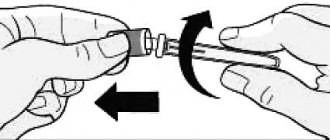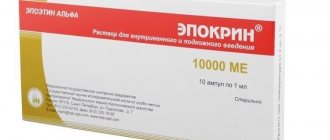Pharmacological properties of the drug Epoetin alfa
Recombinant human erythropoietin (r-HuEPO), a glycoprotein. The biological and immunological properties of r-HuEPO are identical to human erythropoietin isolated from urine. The synthesis of endogenous erythropoietin occurs in the kidneys and depends on the level of blood oxygenation. Stimulates erythropoiesis and has a pronounced effect on anemia caused by chronic kidney disease. The use of epoetin alfa leads to an increase in hematocrit and hemoglobin levels in the blood, improving blood supply to tissues and heart function. When administered intravenously, the half-life in individuals with normal renal function is about 4 hours; in patients with impaired renal function - about 5 hours. With subcutaneous administration, the concentration of epoetin alfa in the blood increases slowly and reaches a maximum in the period from 12 to 18 hours after administration. The half-life is 24 hours.
Epoetin alfa
International name of the medicinal substance:
Epoetin alfa The list of drugs containing the active substance Epoetin alfa is given after the description.
Pharmacological action:
The drug that stimulates erythropoiesis activates mitosis, stimulates the formation of red blood cells from the precursor cells of the erythrocyte series.
The purified glycoprotein is synthesized in mammalian cells into which the gene encoding human erythropoietin is embedded. Biological and immunological properties are identical to human erythropoietin isolated from urine. Leads to an increase in hematocrit and Hb, improvement in blood supply to tissues and heart function. The most pronounced effect is in anemia caused by chronic kidney disease. An increase in hematocrit appears 4 weeks after the start of treatment. Pharmacokinetics:
Bioavailability with subcutaneous administration - 25%, TCmax - 12-18 hours; after subcutaneous administration, Cmax is significantly lower than after intravenous administration; T1/2 - 16-24 hours with subcutaneous administration and 5-6 hours with intravenous administration. Does not accumulate.
Indications:
Anemia (for prevention and treatment): for chronic renal failure in adults and children, incl.
those on hemo- or peritoneal dialysis, as well as in predialysis patients; in HIV-infected patients during treatment with zidovudine (with an endogenous erythropoietin concentration of 500 IU/ml or less); for non-myeloid tumors (including against the background of cytostatic therapy). Preparing patients for surgery with expected massive blood loss (2-4 units or 900-1800 ml) without anemia, as well as with mild or moderate anemia (Hb 100-130 g/l) to reduce the need for allogeneic blood transfusions and improve erythropoiesis. Preparing patients with a hematocrit of 33-39% for major surgery through a predeposit program to facilitate collection of autologous blood and reduce the risk associated with the use of allogeneic blood transfusions (when the expected need for transfusion is higher than the amount that can be obtained without the use of epoetin alfa) . Contraindications:
Hypersensitivity;
partial red cell aplasia after previous therapy with any erythropoietin, uncontrolled arterial hypertension; inability to carry out adequate anticoagulant therapy, pregnancy, lactation. As part of the pre-deposit blood collection program before surgical operations, severe occlusive diseases of the coronary, carotid, cerebral and peripheral arteries and their consequences (including acute and recent myocardial infarction and acute cerebrovascular accident). Side effects:
Flu-like symptoms (at the beginning of treatment): dizziness, drowsiness, fever, headache, myalgia, arthralgia.
Allergic reactions: skin rash (mild or moderate), eczema, urticaria, itching, angioedema. From the cardiovascular side: dose-dependent increase in blood pressure, worsening of arterial hypertension (most often in patients with chronic renal failure), in some cases - hypertensive crisis, a sharp increase in blood pressure with symptoms of encephalopathy (headache, confusion) and generalized tonic-clonic convulsions. From the hematopoietic organs: thrombocytosis, in some cases - shunt thrombosis (in patients on hemodialysis with a tendency to arterial hypotension or with an aneurysm, stenosis, etc.), aplasia of the erythrocyte lineage. Local reactions: hyperemia, burning, mild or moderate pain at the injection site (more often occur with subcutaneous administration). From the laboratory parameters: decrease in serum ferritin concentration, with uremia - hyperkalemia, hyperphosphatemia. Other: complications associated with respiratory failure or decreased blood pressure; immune reactions (induction of antibody formation), exacerbation of porphyria. Interaction:
Reduces the concentration of cyclosporine due to an increase in the degree of its binding to red blood cells (it may be necessary to adjust the dose of cyclosporine).
Pharmaceutically incompatible with solutions of other drugs. Special instructions:
During treatment, it is necessary to monitor blood pressure weekly and perform a complete blood count (including platelets, hematocrit, ferritin).
In the pre- and postoperative period, Hb should be monitored more often if the initial value was less than 140 g/l. It must be remembered that epoetin alfa in the treatment of anemia does not replace blood transfusion, but reduces the need for its repeated use. In patients with controlled arterial hypertension or a history of thrombotic complications, an increase in the dose of antihypertensive drugs and anticoagulants may be required, respectively. When prescribed to patients with liver failure, a slowdown in the metabolism of epoetin alfa and a pronounced increase in erythropoiesis are possible. The safety of the drug in this category of patients has not been established. Although the drug stimulates erythropoiesis, the possibility of epoetin alfa affecting the growth of certain types of tumors, including bone marrow. The possibility that a preoperative increase in Hb may predispose to the development of thrombotic complications should be considered. Before undergoing elective surgery, patients should receive adequate prophylactic antiplatelet therapy. In the pre- and postoperative period, it is not recommended to prescribe it to patients with an initial Hb of more than 150 g/l. In adult patients with chronic renal failure and clinically significant ischemic heart disease or heart failure, Hb should not exceed 100-120 g/l. Before starting treatment, possible causes of an inadequate reaction to the drug should be excluded (deficiency of Fe, folic acid, cyanocobalamin, severe Al3+ poisoning, concomitant infections, inflammatory processes and injuries, hidden bleeding, hemolysis, bone marrow fibrosis of various etiologies) and, if necessary, adjust the treatment. Before starting treatment, iron reserves in the body should be assessed. In most patients with chronic renal failure, in cancer and HIV-infected patients, the plasma ferritin concentration decreases simultaneously with an increase in hematocrit. Ferritin concentrations must be determined throughout the course of treatment. If it is less than 100 ng/ml, replacement therapy with oral Fe preparations is recommended at a rate of 200-300 mg/day (100-200 mg/day for children). Patients donating autologous blood and in the pre- or postoperative period should also receive an adequate amount of Fe orally at a dose of 200 mg/day. In patients with chronic renal failure, correction of anemia may result in improved appetite and increased absorption of K+ and proteins. Periodic adjustments of dialysis parameters may be required to maintain BUN, creatinine, and K+ concentrations within normal limits. In patients with chronic renal failure, it is necessary to monitor serum electrolytes. According to available data, the use of epoetin alfa in predialysis patients does not accelerate the progression of chronic renal failure. Due to increased hematocrit, it is often necessary to increase the dose of heparin during hemodialysis. With inadequate heparinization, blockage of the dialysis system and thrombosis of shunts are possible, especially in patients with a tendency to hypotension or with complications of an arteriovenous fistula (stenosis, aneurysm, etc.). In such patients, early revision of the shunt and timely prevention of thrombosis (for example, ASA) are recommended. Use during pregnancy and lactation is possible only in cases where the potential benefit to the mother outweighs the potential risk to the fetus. It is not known whether epoetin alfa is excreted in breast milk. When used in women of reproductive age with anemia due to chronic renal failure, menstruation may resume. The patient should be warned about the possibility of pregnancy and the need to use reliable methods of contraception before starting therapy. Experimental studies on rats and rabbits did not reveal a teratogenic effect when administered intravenously in doses up to 500 IU/kg body weight per day; at higher doses, a weak, statistically insignificant decrease in fertility was noted. A study of chronic toxicity (in rats and dogs) of epoetin alfa revealed the development of subclinical fibrosis of bone marrow tissue. During the 13-week study, dogs treated subcutaneously or intravenously at doses of 80, 240, or 520 units/kg/day developed anemia without or with signs of bone marrow hypoplasia. Due to the fact that epoetin alfa is a human glycoprotein, it is recognized that these changes could be caused by the action of antibodies to epoetin alfa. Similar phenomena were observed in isolated cases when using the drug in veterinary practice and were explained by the appearance of antibodies to epoetin alfa. No carcinogenicity studies have been conducted. Epoetin alfa does not cause gene mutations in bacteria (Ames test), chromosomal aberrations in mammalian cells, micronuclei in mice, or gene mutations in the HGRT locus. During the treatment period, until the optimal maintenance dose is established for patients with chronic renal failure, care must be taken when driving vehicles and engaging in other potentially hazardous activities that require increased concentration and speed of psychomotor reactions (increased risk of increased blood pressure at the beginning of therapy). Patients can be transferred from one stimulant to another only in agreement with the attending physician. Preparations containing the active substance Epoetin alfa:
Aeprin, Binocrit, Rapoetin-SP, Epocomb, Epokrin, Eprex, Eralfon, recombinant human erythropoietin, Erytrostim
The information provided in this section is intended for medical and pharmaceutical professionals and should not be used for self-medication. The information is provided for informational purposes only and cannot be considered official.
Use of Epoetin alfa
correction phase - the initial dose is 50 units/kg body weight 3 times a week. If necessary, after 1 month the dose can be increased to 75 units/kg 3 times a week; in the future, the dose can be increased by 25 units/kg at intervals of 1 month; maintenance phase - the dose is selected individually for each patient so that the hematocrit does not exceed 35 vol.%. Usually prescribed at a dose of 30-100 units/kg 3 times a week after dialysis. The maximum dose should not exceed 200 units/kg 3 times a week. Injected subcutaneously or intravenously. The duration of the IV injection is 1–2 minutes.
Epoetin alfa
Use with caution in patients with a history of convulsive reactions; Patients at increased risk of developing thrombosis or other vascular complications require careful medical monitoring.
Use with caution for gout.
Before use, ensure that patients with arterial hypertension have received effective antihypertensive therapy.
During use, it is necessary to monitor blood pressure levels, paying attention to the occurrence or worsening of unusual headaches. This may require adjustment of therapy or prescription of antihypertensive drugs. If blood pressure does not decrease despite adequate therapy, epoetin alfa should be discontinued.
Before starting the use of epoetin alfa, the state of the iron depot in the body should be assessed. In most patients with chronic renal failure, in cancer and HIV-infected patients, the level of ferritin in the blood plasma decreases simultaneously with an increase in hematocrit. Ferritin levels must be determined throughout the course of treatment. If it is less than 100 ng/ml, iron replacement therapy is recommended. Patients who donate autologous blood and are in the pre- or postoperative period should also receive additional adequate amounts of iron.
During the period of use, hemoglobin levels should be monitored at least once a week until a stable level is reached, then somewhat less frequently. In the pre- and postoperative period, hemoglobin levels should be checked more often if the initial level was less than 14 g/dL. Hematocrit levels should also be monitored regularly. During the first 8 weeks of therapy, the platelet count should be regularly monitored because epoetin alfa can cause a moderate dose-dependent increase in the number of platelets, which independently returns to normal during the course of therapy; thrombocytosis develops rarely.
It should be taken into account that a preoperative increase in hemoglobin levels may serve as a predisposing factor to the development of thrombotic complications. Patients should receive adequate prophylactic antithrombotic therapy before undergoing elective surgery.
In the pre- and postoperative period, it is not recommended to use epoetin alfa if the initial hemoglobin level is more than 15 g/dl.
Use with caution in patients with porphyria. In case of chronic renal failure during therapy with epoetin alfa, an exacerbation of porphyria is possible.
Correction of anemia may be accompanied by improved appetite and increased absorption of potassium and proteins. It should be borne in mind that it may be necessary to periodically adjust dialysis parameters to maintain levels of urea, creatinine and potassium within normal limits. In patients with chronic renal failure, it is necessary to monitor the level of electrolytes in the blood serum.
Hemodialysis patients treated with epoetin alfa often require increased heparin dosage during dialysis due to increased hematocrit. With an inadequate dose of heparin, occlusion of the dialysis system is possible.
In patients with chronic renal failure and clinically significant coronary artery disease or congestive heart failure, maintenance hemoglobin levels should not exceed the upper limit of the optimal recommended level (no more than 10-12 g/dL in adults).
When used in patients with impaired liver function, the biotransformation of epoetin alfa may be slowed down and erythropoiesis may be significantly increased. The safety of epoetin alfa in this category of patients has not been established.
The possibility that epoetin alfa may influence the growth of certain types of tumors, especially bone marrow malignancies, cannot be completely excluded.
All special warnings and precautions associated with the autologous blood collection program should be observed (this applies to all patients receiving epoetin alfa).
The therapeutic effectiveness of epoetin alfa may be reduced by deficiency of iron, folic acid, vitamin B12, aluminum intoxication, intercurrent diseases, hidden bleeding, hemolysis, bone marrow fibrosis.
In experimental studies
In animals, when studying the chronic toxicity of epoetin alfa, subclinical fibrosis of bone marrow tissue was observed in some cases, as well as anemia with or without signs of bone marrow hypoplasia. It is believed that this is due to the appearance of antibodies to epoetin alfa.
No mutagenic effect was detected.
Impact on the ability to drive vehicles and operate machinery
When using epoetin alfa, until the optimal maintenance dose is established, patients with chronic renal failure should avoid engaging in potentially hazardous activities due to an increased risk of developing arterial hypertension at the beginning of therapy.




